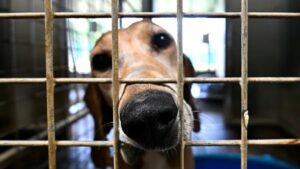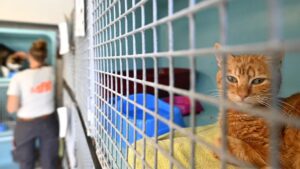5 Key Points to Know About the Animal Welfare Bill Proposed by French MP Éric Pauget
French MP Eric Pauget, representing the Republicans in the 7th constituency of Alpes-Maritimes, submitted a bill to the National Assembly on November 7th. His aim is to “go even further to enhance animal welfare and combat abuse.”
The proposed law, numbered 1827 and submitted on November 7th to the National Assembly, focuses on curbing impulsive pet purchases and reducing the number of abandonments.
In this legislation, co-signed by around twenty other parliamentarians, including Christelle D’Intorni, the Republican deputy of the 5th constituency of Alpes-Maritimes, Pauget starts by highlighting that “between May 1st and August 31st, 2023, 16,498 pets were abandoned in France, with abandonments increasing by 20% each month.”
France: The European Champion in Pet Abandonment
The foundation of this proposed law is a set of staggering figures. Two statistics stand out, directly impacting the rise in abandonments due to increased food costs (+18%) and veterinary care expenses (+15%).
Pauget’s bill aims to go beyond certain aspects of the Loic Dombreval Law. “While the law of November 30, 2021, aimed at combating animal cruelty and strengthening the bond between animals and humans, has made progress, recent events unfortunately show that this text has not stemmed the tide of abandonments,” details Éric Pauget.
France holds the title of the European champion in pet abandonment.
Eric Pauget, deputy of the 7th constituency of Alpes-Maritimes.
On November 13th, during an interview on France Bleu Azur, he revealed a staggering figure of 100,000 abandonments, including dogs, cats, and even “NAC” (new pets) such as ferrets.
Justice also takes action. In 2021, 12,000 infractions were related to animal cruelty or conditions, with 40% of this number directly linked to cases of animal cruelty.
Adoption: Is a License Necessary?
A certificate of commitment and knowledge for acquiring a pet already exists, established by the 2021 law. It must be signed by the person acquiring or adopting the animal, whether from an animal shelter, a Society for the Protection of Animals (SPA), or a pet store. The certificate outlines various responsibilities towards the animal, including observing its behavior, providing medical care, and generally taking care of dogs or cats.
Although these double-sided sheets are distributed, they are never stored or centralized. A simple signature is sufficient. According to Eric Pauget, this certificate could become a de facto license.
The proposed law mentions the “progressive establishment of a pet ownership license,” which would be “initially tacitly granted immaterially to all pet owners.”
Ambitious Animal Welfare Proposal
French MP Eric Pauget, representing the Alpes-Maritimes constituency, aims to take animal welfare measures a step further by proposing the establishment of a centralized computerized database. He openly acknowledges drawing inspiration from Belgian legislation, citing it as an example.
According to Pauget’s proposal, adoption would require “the prior production of an extract of non-registration in the national database of offenders of crimes against animals for all individuals wishing to acquire a new animal from January 1, 2027.”
The third article of the proposed law aims to create a national database of offenders of crimes against animals (FNAIA). Similar to any other offense, individuals convicted of animal cruelty would be prohibited from adopting an animal. Those seeking adoption would also need to provide a certificate from the FNAIA.
A waiting period of 15 days would be observed as a “maturation time,” explains the deputy.
Sworn Guards: Enforcing the Law
Who would be responsible for ensuring compliance with this new law? Pauget proposes the creation of a sworn guard corps “knowledgeable in animal law and capable of intervening,” modeled after game and fisheries wardens.
Pauget also envisions the possibility of granting “judicial power in the field of animal legislation, making them the first responders” to individuals in the associative or animal sector, such as refuge managers.
“Legislatively, it’s quite straightforward,” adds the deputy from Antibes.
A Law Going Too Far?
A series of measures, a process for adopters… these constraints may weigh on the adoption desires of some of the population. Pauget sees this as a necessary evil initially.
In Article 5, it is stated: “The space, lighting, temperature, humidity, ventilation, and other ambient conditions respect the natural, cognitive, and physiological needs specific to each species.”
The list of environmental parameters for the well-being of pets would become quite extensive, including humidity measurement. Despite potential complications, Pauget deems these specifications necessary, even indispensable, given the care required for certain “NAC” (new pets), such as reptiles.
The question remains whether this proposed law will garner support in both chambers: the National Assembly and the Senate.
There are possibilities to expedite the implementation of these proposals. “There are two scenarios: either the government could translate this text into amendments […] or we could take advantage of a parliamentary group’s time slot.”
While Pauget considers these proposals “innovative,” he does not necessarily see them as an inseparable package. The fate of this proposed law will determine whether these five articles could soon be implemented, perhaps as early as 2024.






























































